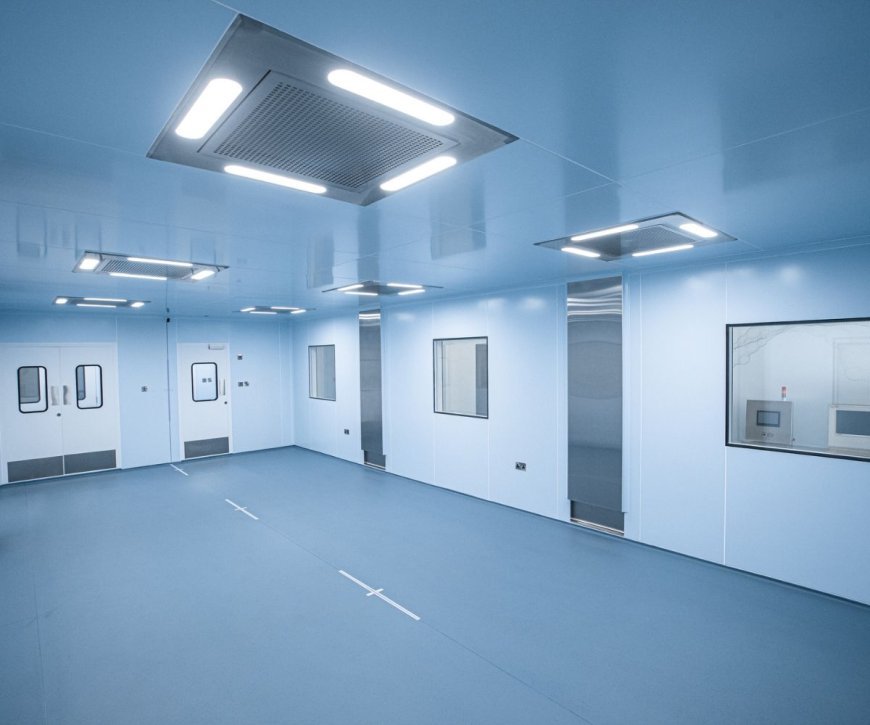Clean Room Construction in Singapore – A Comprehensive Guide

What Is Clean Room Construction?
Key Elements of Clean Room Design
A well-structured clean room consists of specific elements that ensure contamination control and maintain industry standards.
1. Air Filtration Systems
High-efficiency particulate Air (HEPA) and Ultra-Low Penetration Air (ULPA) filters remove airborne particles, ensuring clean air circulation. These filters are crucial in maintaining controlled environments.
2. Controlled Ventilation
Proper airflow control prevents contamination by directing air movement strategically. Laminar and turbulent airflow techniques help maintain clean room standards.
3. Temperature and Humidity Regulation
Precise temperature and humidity control is essential to prevent static electricity, condensation, and microbial growth.
4. Specialized Flooring and Walls
Non-porous, easy-to-clean materials such as epoxy-coated floors and seamless walls reduce contamination risks and improve cleanliness.
Industries That Require Clean Rooms in Singapore
Clean rooms play a crucial role in various sectors, ensuring product quality and regulatory compliance.
1. Pharmaceutical and Biotechnology
Sterile environments are mandatory in pharmaceutical manufacturing to prevent contamination of medicines and vaccines.
2. Semiconductor and Electronics
Microscopic particles can damage sensitive electronic components. Clean rooms maintain dust-free conditions for semiconductor production.
3. Aerospace and Automotive
High-precision parts in aerospace and automotive industries require controlled environments to avoid defects during assembly.
4. Medical Device Manufacturing
Strict regulatory requirements demand clean room environments for medical device production to ensure patient safety.
Standards and Regulations for Clean Room Construction
Singapore follows international standards to ensure clean room efficiency and compliance.
1. ISO 14644-1 Classification
This standard defines cleanliness levels based on particle count per cubic meter. It categorizes clean rooms from ISO Class 1 (most stringent) to ISO Class 9.
2. GMP (Good Manufacturing Practice) Compliance
Industries like pharmaceuticals must adhere to GMP guidelines to ensure product safety and quality.
3. NEA (National Environment Agency) Regulations
Singapore’s NEA imposes regulations on air quality, waste management, and environmental control in clean rooms.
Benefits of Clean Room Construction
Investing in a high-quality clean room offers numerous advantages for businesses in Singapore.
1. Improved Product Quality
A controlled environment ensures defect-free production, enhancing product reliability and performance.
2. Regulatory Compliance
Meeting industry standards prevents legal issues and ensures market acceptance of products.
3. Enhanced Efficiency and Cost Savings
Minimized contamination reduces product rejection rates, lowering operational costs.
Choosing a Reliable Clean Room Construction Company in Singapore
Selecting the right contractor is essential for building a functional clean room that meets industry requirements.
1. Experience and Expertise
Look for companies with a proven track record in clean room design and construction.
2. Customization Options
A good contractor offers tailored solutions to match specific industry needs.
3. Compliance with Industry Standards
Ensure the company follows ISO, GMP, and NEA guidelines for clean room construction.
Conclusion
Clean room construction in Singapore is vital for industries that require contamination-free environments. Investing in high-quality clean rooms ensures regulatory compliance, improved product quality, and operational efficiency. Choose a trusted clean room contractor to meet your specific industry requirements.
FAQs: Frequently Asked Question
Q. What is a cleanroom?
Ans. A cleanroom is a controlled environment that maintains low levels of pollutants, such as dust, airborne microbes, and chemical vapours, to ensure product quality and safety.
Q. Why is cleanroom construction important in Singapore?
Ans. Cleanrooms are critical for industries like pharmaceuticals, electronics, biotechnology, and healthcare in Singapore, ensuring compliance with stringent standards for safety and quality control.
Q. What are the key standards for cleanroom construction in Singapore?
Ans. Cleanroom construction in Singapore must meet international standards such as ISO 14644, GMP, and other industry-specific regulations, ensuring environmental control and safety.
Q. How do I choose the right cleanroom design?
Ans. The right cleanroom design depends on your industry needs, such as contamination control, airflow management, and space requirements. Consult with a professional cleanroom design company to tailor a solution for your business.
What's Your Reaction?




























































